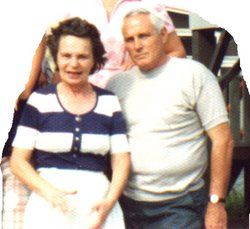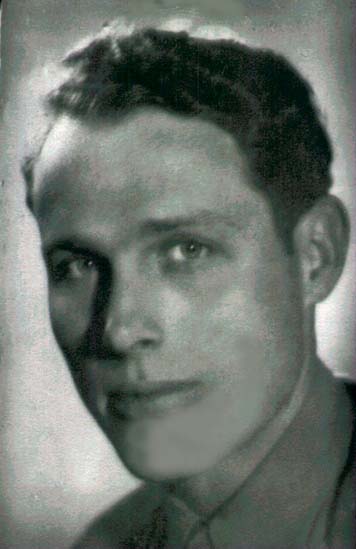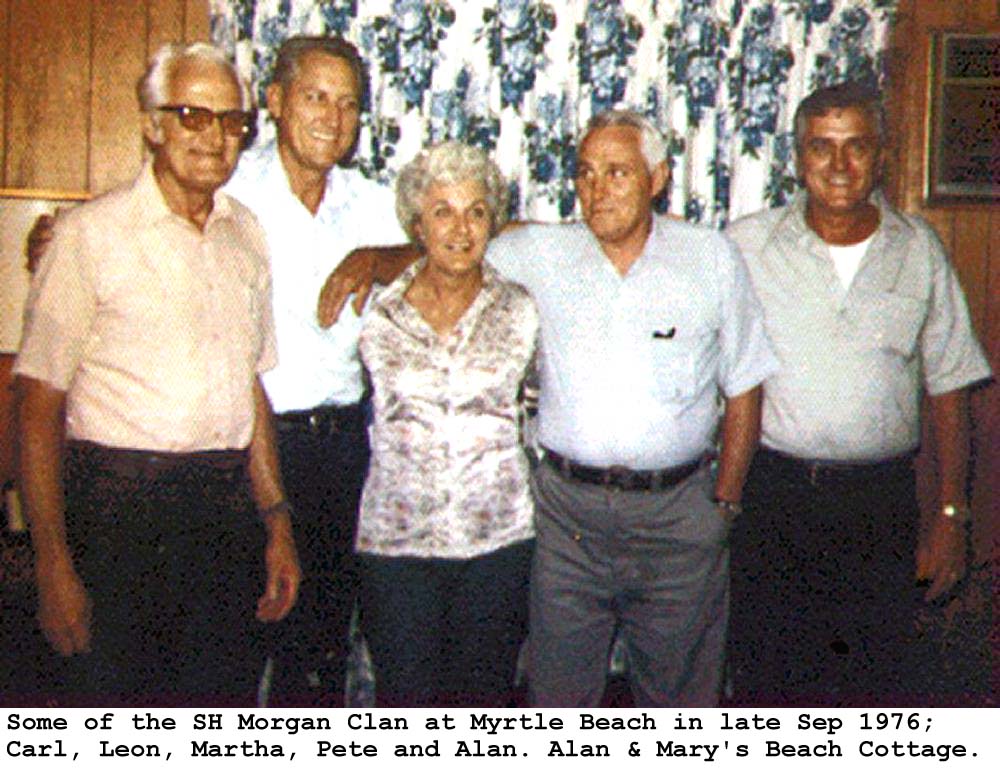Siblings are Shepard Alan Morgan , Carl Andrew Morgan , Gale Freeman Morgan , Evelyn M. King , Hobart S Morgan Peggy M. Finlay, Martha M Bruffey , L. Frank Morgan,
Wife, Mimi
Pete establish an automobile repair shop in the Washington, D.C. area in 1948 and became very successful as a craftsman shop for repairing the luxury cars of many Washingtonians, including many members of the U.S. Government. Pete bought acreage in Gaithersburg, Maryland and in Warrenton, Virginia where he built family homes in a country setting. In the manner of time elapsed photography, I watched Pete and wife Mimi provide an outstanding environment for the three children, Alan, Ronnie and Patty to grow up in. Pete's grandson, Matt, or Matthew Alexander Morgan, second son of Ronnie and Sherry Morgan, wrote the following for High School English composition in either 1991 or 1992, telling about stories of his grandfather's adventures during WWII.
THE PERILS OF A RAILROAD ENGINEER
BY MATT MORGAN
"My grandfather was an engineer for the American military in France in WWII. He had many interesting adventures and tall stories to tell his sons (my father and uncle). It is difficult for me to picture my grandfather as a young engineer in the war. I remember one tale where he describes a run from one town to another that started as a race between him and one of his friends who had to makethe same trip. They joked with each other about who could get there first. Because two trains could not generally pass on a track unless there is a switch track, it was to come down to whoever was to leave first. When his friend left before him, he knew he had lost and thought it was over. Later as he was on the trip, he saw his friend pulled off on one of the switch tracks as he passed. He smiled and went on knowing that he had won. At one point in the journey, he pulled off at a station to pick up some coal for fuel. During WWII, the rule was that my grandfather had the right to take whatever coal he needed to keep the military's trains running, and he had priority over other needs at whatever place he stopped. Naturally, when he saw a pile of coal on the side of the tracks, he told the French officer there to load the coal on the train. The French officer could not speak much english, and my grandfather could speak almost no French. Nevertheless, the man at the station understood what he wanted because that was part of his job. Strangely, he protested and would not load the coal. Again, my grandfather ordered him to load it, and again, the man insisted not to. Eventually, my grandfather pulled out his gun and pointed at the man and demanded the coal. Finally, the French officer gave in and loaded the coal. By now, my grandfather was getting nervous that his friend was going to pass while he was arguing with the guard, so when he finally got the coal, he told the fireman who shoveled the coal into the boiler, to put in as much as he could. After a while, the train began to speed unusually fast and the pressure gage was rising faster than normal. My grandfather told the fireman to take a break. The pressure continued to rise! As it turns out, the stuff he picked up was coke not coal. Coke is a refined form of coal that burns much hotter than coal, and is used for melting steel! That was what the officer was trying to warn him about. The trains back then had a safety feature in which they had a lever to pull that would open the grates in the furnace and drop the coal on the ground in case of an emergency. When my grandfather realized that the train was out of control, he tried to pull the lever, but the fire had gotten so hot that it melted the grates shut! The only way left to release pressure, and stop an out of control train was to tie down the whistle (to let steam out) and run the train as fast as it could go until the fire died out. They had no speedometers then, but my grandfather said that when he leaned his head out the window and looked down and looked down at the driving rod on the wheels, it was just a big blur. Luckily, he made it without the boiler blowing up.
Another time, my grandfather was under attack from an enemy plane. The first time it passed over, it strafed in the same direction the train was moving, and the fireman was wounded. Unfortunately, the train itself was so loud that neither of them even heard the plane shooting, but when my grandfather looked over and saw the fireman rolling around on the floor, he looked out and saw the plane was overhead and begin to turn around and try again. This time it was coming right at them in the opposite direction. My grandfather tied down the whistle, which was a distress signal for trains. My grandfather and the fireman were laying low on the floor by the thirdtime the plane came around. This time, however, the plane did not shoot, it just sped up and passed. My grandfather looked out the window and saw two American planes chasing it! In a few minutes he heard an explosion off in the distance. A few seconds later, he saw the American planes coming
back and they dipped their wings as they passed overhead. I remember the story because it mentioned how he could not hear the sound of the plane over the noise that the train made made. My grandfather was deaf when I knew him, and it was due to being exposed to that kind of noise for so many years. My grandfather was an excellent man when I knew him and sounded like an excellent man before I was born. I always remember him through his stories about his experiences. He lived an extraordinary life before and after the war, but he seemed most remarkable as a WWII railroad engineer."
Siblings are Shepard Alan Morgan , Carl Andrew Morgan , Gale Freeman Morgan , Evelyn M. King , Hobart S Morgan Peggy M. Finlay, Martha M Bruffey , L. Frank Morgan,
Wife, Mimi
Pete establish an automobile repair shop in the Washington, D.C. area in 1948 and became very successful as a craftsman shop for repairing the luxury cars of many Washingtonians, including many members of the U.S. Government. Pete bought acreage in Gaithersburg, Maryland and in Warrenton, Virginia where he built family homes in a country setting. In the manner of time elapsed photography, I watched Pete and wife Mimi provide an outstanding environment for the three children, Alan, Ronnie and Patty to grow up in. Pete's grandson, Matt, or Matthew Alexander Morgan, second son of Ronnie and Sherry Morgan, wrote the following for High School English composition in either 1991 or 1992, telling about stories of his grandfather's adventures during WWII.
THE PERILS OF A RAILROAD ENGINEER
BY MATT MORGAN
"My grandfather was an engineer for the American military in France in WWII. He had many interesting adventures and tall stories to tell his sons (my father and uncle). It is difficult for me to picture my grandfather as a young engineer in the war. I remember one tale where he describes a run from one town to another that started as a race between him and one of his friends who had to makethe same trip. They joked with each other about who could get there first. Because two trains could not generally pass on a track unless there is a switch track, it was to come down to whoever was to leave first. When his friend left before him, he knew he had lost and thought it was over. Later as he was on the trip, he saw his friend pulled off on one of the switch tracks as he passed. He smiled and went on knowing that he had won. At one point in the journey, he pulled off at a station to pick up some coal for fuel. During WWII, the rule was that my grandfather had the right to take whatever coal he needed to keep the military's trains running, and he had priority over other needs at whatever place he stopped. Naturally, when he saw a pile of coal on the side of the tracks, he told the French officer there to load the coal on the train. The French officer could not speak much english, and my grandfather could speak almost no French. Nevertheless, the man at the station understood what he wanted because that was part of his job. Strangely, he protested and would not load the coal. Again, my grandfather ordered him to load it, and again, the man insisted not to. Eventually, my grandfather pulled out his gun and pointed at the man and demanded the coal. Finally, the French officer gave in and loaded the coal. By now, my grandfather was getting nervous that his friend was going to pass while he was arguing with the guard, so when he finally got the coal, he told the fireman who shoveled the coal into the boiler, to put in as much as he could. After a while, the train began to speed unusually fast and the pressure gage was rising faster than normal. My grandfather told the fireman to take a break. The pressure continued to rise! As it turns out, the stuff he picked up was coke not coal. Coke is a refined form of coal that burns much hotter than coal, and is used for melting steel! That was what the officer was trying to warn him about. The trains back then had a safety feature in which they had a lever to pull that would open the grates in the furnace and drop the coal on the ground in case of an emergency. When my grandfather realized that the train was out of control, he tried to pull the lever, but the fire had gotten so hot that it melted the grates shut! The only way left to release pressure, and stop an out of control train was to tie down the whistle (to let steam out) and run the train as fast as it could go until the fire died out. They had no speedometers then, but my grandfather said that when he leaned his head out the window and looked down and looked down at the driving rod on the wheels, it was just a big blur. Luckily, he made it without the boiler blowing up.
Another time, my grandfather was under attack from an enemy plane. The first time it passed over, it strafed in the same direction the train was moving, and the fireman was wounded. Unfortunately, the train itself was so loud that neither of them even heard the plane shooting, but when my grandfather looked over and saw the fireman rolling around on the floor, he looked out and saw the plane was overhead and begin to turn around and try again. This time it was coming right at them in the opposite direction. My grandfather tied down the whistle, which was a distress signal for trains. My grandfather and the fireman were laying low on the floor by the thirdtime the plane came around. This time, however, the plane did not shoot, it just sped up and passed. My grandfather looked out the window and saw two American planes chasing it! In a few minutes he heard an explosion off in the distance. A few seconds later, he saw the American planes coming
back and they dipped their wings as they passed overhead. I remember the story because it mentioned how he could not hear the sound of the plane over the noise that the train made made. My grandfather was deaf when I knew him, and it was due to being exposed to that kind of noise for so many years. My grandfather was an excellent man when I knew him and sounded like an excellent man before I was born. I always remember him through his stories about his experiences. He lived an extraordinary life before and after the war, but he seemed most remarkable as a WWII railroad engineer."















